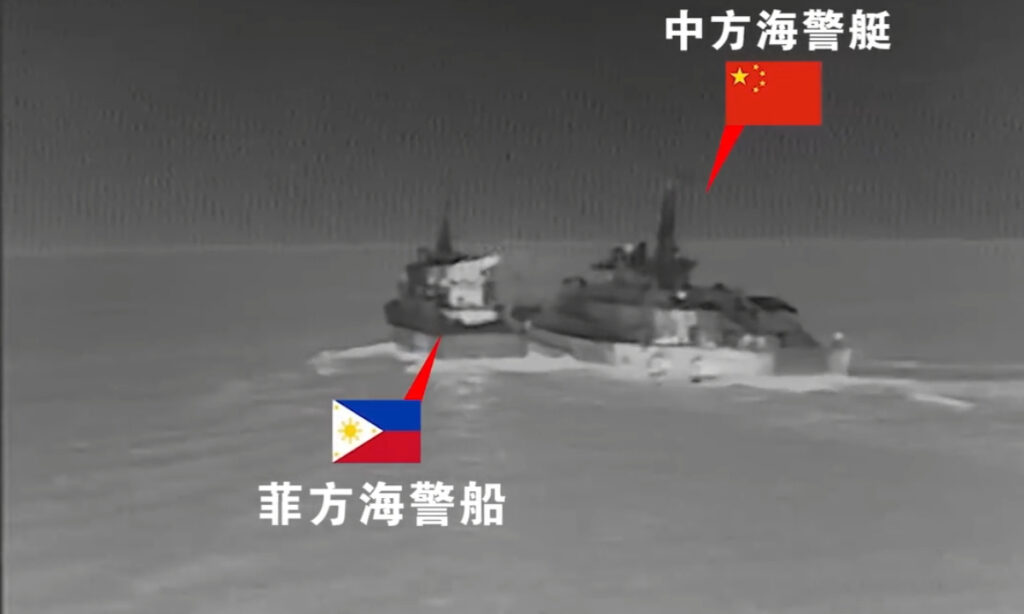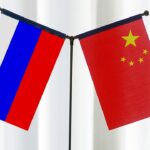The China Coast Guard (CCG) on Monday took legitimate, professional and restrained restrictive measures on Philippine Coast Guard ships when they consecutively intruded into waters adjacent to two Chinese reefs in the South China Sea, with experts slamming the Philippine’ dangerous moves of brinkmanship that violate China’s territorial sovereignty.
The Philippine Coast Guard ships MRRV-4410 and MMRV-4411 on Monday illegally intruded waters adjacent to Xianbin Jiao (also known as Xianbin Reef) of China’s Nansha Qundao (also known as Nansha Islands), and the CCG conducted restrictive measures in accordance with the law, CCG spokesperson Gan Yu said in a statement on early Monday.
At 3:24 am, the MRRV-4410 ignored repeated stern warnings from the Chinese side and intentionally rammed into the CCG Vessel 21551 that was conducting normal rights-safeguarding and law enforcement activities, resulting in a minor collision, Gan said, stressing that the responsibility lies with the Philippine side.
The CCG released two videos showing the MRRV-4410’s ramming into the CCG Vessel 21551.
Experts told the Global Times that the CCG vessel was clearly sailing in a straight line when the Philippine ship on its port side suddenly turned right, causing a collision.
Then at about 6:00 am, after the MRRV-4410 saw its attempt to illegally intrude waters adjacent to Xianbin Jiao blocked, it again illegally intruded waters adjacent to Ren’ai Jiao (also known as Ren’ai Reef) of China’s Nansha Qundao, ignoring repeated warnings and route restrictions by the Chinese side, Gan said in a separate statement on Monday.
The CCG took restrictive measures on the Philippine ship in accordance with the law and regulations, the CCG spokesperson said.
The Philippines repeatedly made provocations and stirred up troubles, violated the temporary arrangement reached by the two sides about delivering supplies of living material to the Philippine’ vessel illegally grounded on Ren’ai Jiao, seriously violated China’s sovereignty, and severely sabotaged peace and stability in the region, Gan said.
Gan demanded that the Philippines stop its provocations immediately, or all consequences that could happen are to be borne by the Philippine side.
The Philippines’ consecutive trespasses into waters adjacent to both Xianbin Jiao and Ren’ai Jiao are an irresponsible, dangerous escalation to the situation, analysts said.
Chen Xiangmiao, director of the World Navy Research Center at the National Institute for South China Sea Studies, told the Global Times on Monday that the Philippines sees Xianbin Jiao as a transfer station for its resupply missions to Ren’ai Jiao, as Xianbin Jiao is located between Ren’ai Jiao and the Philippines’ Palawan Province.
The Philippines thought if it moved simultaneously around Xianbin Jiao and Ren’ai Jiao, China might not be able to deal with the situation, Chen said.
But the CCG has demonstrated its capabilities in safeguarding China’s territorial sovereignty and maritime rights, experts said. Immediate responses and official statements also displayed the CCG’s rapid response.
The CCG successfully restricted the Philippines’ provocative, malicious intrusion in accordance with the law and regulations in a professional, up-to-standard and restrained manner, Yang Xiao, deputy director of the Institute of Maritime Strategy Studies under the China Institute of Contemporary International Relations, told the Global Times on Monday.
The Nansha Qundao, of which Xianbin Jiao and Ren’ai Jiao are a part of, are China’s inherent territories, and China has undisputed sovereignty over the Nansha Qundao, experts noted.
The Philippines’s provocations are a kind of political brinkmanship aimed to test the possibility of US intervention under extreme conditions, Yang said.
The Philippines must give up the vile act of provoking its neighbor and testing its ally and return to a civilized way of resolving the issue through talks and negotiations, Yang noted.
US instigation
The Philippines’ provocations on Chinese islands and reefs in the South China Sea started about one year ago, and from the beginning they were instigated by the US, which wants to use the Philippines as a foothold on the southern end of the first island chain to form a strategic encirclement designed to contain China, analysts said.
While the Philippines wants to get the US more involved in confronting China directly in the South China Sea, the US wants the Philippines to be the pawn and does not want to engage China militarily, military experts said.
The Philippines should understand that the US’ so-called promises and commitments are only lip services, and its instigations will only push the Philippines, as well as the whole region, into tension or even conflicts, which benefit no one other than the US itself, the experts said.
Li Kaisheng, vice president of the Shanghai Institutes for International Studies, told the Global Times on Monday that the reasons behind the Philippines’ provocation include Philippine President Ferdinand Marcos Jr’s domestic political struggle as well as the US’ instigation.
However, the Philippines misjudged its own strength, as its coast guard and military are not on the same level as those of China’s despite support by some other countries, Li said.
Li said that the Philippines also misjudged China’s intentions, believing that China’s previous restraint and goodwill of promoting a resolution to the issue through talks mean China dare not use force under international public opinion. However, China’s stance on sovereignty has always been firm, and if China determines that the Philippines is no longer trustworthy, its countermeasures will be powerful enough for the Philippines to find difficult to withstand.
GT




